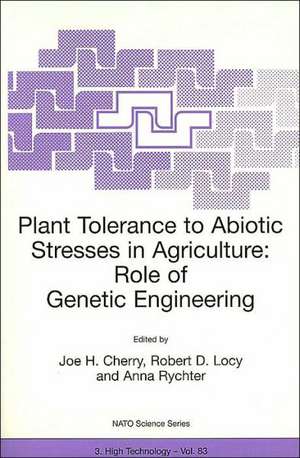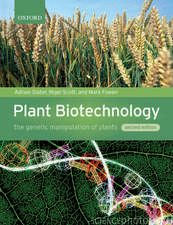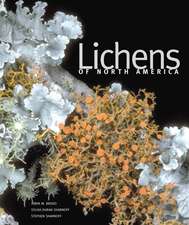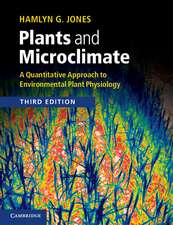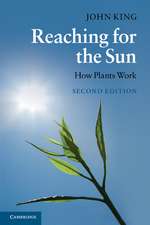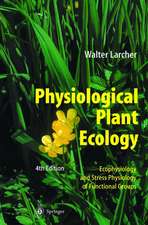Plant Tolerance to Abiotic Stresses in Agriculture: Role of Genetic Engineering: NATO Science Partnership Subseries: 3, cartea 83
Editat de Joe H. Cherry, Robert D. Locy, Anna Rychteren Limba Engleză Paperback – 30 sep 2000
The present book brings together contributions from many laboratories around the world to discuss and compare our current knowledge of the role stress genes play in plant stress tolerance. In addition, strategies are discussed to introduce these genes and the processes that they encode into economically important crops, and the effect this will have on plant productivity.
| Toate formatele și edițiile | Preț | Express |
|---|---|---|
| Paperback (1) | 948.47 lei 6-8 săpt. | |
| SPRINGER NETHERLANDS – 30 sep 2000 | 948.47 lei 6-8 săpt. | |
| Hardback (1) | 960.42 lei 6-8 săpt. | |
| SPRINGER NETHERLANDS – 30 sep 2000 | 960.42 lei 6-8 săpt. |
Din seria NATO Science Partnership Subseries: 3
- 24%
 Preț: 1567.22 lei
Preț: 1567.22 lei - 18%
 Preț: 1992.08 lei
Preț: 1992.08 lei -
 Preț: 393.13 lei
Preț: 393.13 lei -
 Preț: 390.63 lei
Preț: 390.63 lei - 18%
 Preț: 1849.41 lei
Preț: 1849.41 lei -
 Preț: 407.19 lei
Preț: 407.19 lei - 18%
 Preț: 1228.96 lei
Preț: 1228.96 lei - 18%
 Preț: 1843.73 lei
Preț: 1843.73 lei - 15%
 Preț: 642.51 lei
Preț: 642.51 lei -
 Preț: 402.76 lei
Preț: 402.76 lei - 18%
 Preț: 1829.86 lei
Preț: 1829.86 lei -
 Preț: 379.48 lei
Preț: 379.48 lei - 18%
 Preț: 1224.54 lei
Preț: 1224.54 lei -
 Preț: 401.42 lei
Preț: 401.42 lei - 18%
 Preț: 1841.68 lei
Preț: 1841.68 lei -
 Preț: 391.99 lei
Preț: 391.99 lei - 18%
 Preț: 1234.46 lei
Preț: 1234.46 lei -
 Preț: 405.28 lei
Preț: 405.28 lei -
 Preț: 396.62 lei
Preț: 396.62 lei - 18%
 Preț: 1226.73 lei
Preț: 1226.73 lei - 18%
 Preț: 1233.52 lei
Preț: 1233.52 lei - 18%
 Preț: 1228.62 lei
Preț: 1228.62 lei - 5%
 Preț: 377.52 lei
Preț: 377.52 lei - 18%
 Preț: 1830.49 lei
Preț: 1830.49 lei - 20%
 Preț: 336.21 lei
Preț: 336.21 lei - 18%
 Preț: 1225.48 lei
Preț: 1225.48 lei -
 Preț: 397.38 lei
Preț: 397.38 lei - 18%
 Preț: 1830.65 lei
Preț: 1830.65 lei - 15%
 Preț: 650.55 lei
Preț: 650.55 lei - 5%
 Preț: 1416.66 lei
Preț: 1416.66 lei
Preț: 948.47 lei
Preț vechi: 1156.67 lei
-18% Nou
Puncte Express: 1423
Preț estimativ în valută:
181.55€ • 197.27$ • 152.60£
181.55€ • 197.27$ • 152.60£
Carte tipărită la comandă
Livrare economică 21 aprilie-05 mai
Preluare comenzi: 021 569.72.76
Specificații
ISBN-13: 9780792365679
ISBN-10: 0792365674
Pagini: 360
Ilustrații: XIII, 360 p.
Dimensiuni: 160 x 240 x 20 mm
Greutate: 0.53 kg
Ediția:Softcover reprint of the original 1st ed. 2000
Editura: SPRINGER NETHERLANDS
Colecția Springer
Seria NATO Science Partnership Subseries: 3
Locul publicării:Dordrecht, Netherlands
ISBN-10: 0792365674
Pagini: 360
Ilustrații: XIII, 360 p.
Dimensiuni: 160 x 240 x 20 mm
Greutate: 0.53 kg
Ediția:Softcover reprint of the original 1st ed. 2000
Editura: SPRINGER NETHERLANDS
Colecția Springer
Seria NATO Science Partnership Subseries: 3
Locul publicării:Dordrecht, Netherlands
Public țintă
ResearchCuprins
I High Temperature Stress.- Functional Specialization of Plant Class A and B HSFs.- The Arabidopsis TCH Genes: Regulated in Expression by Mechanotransduction?.- The Regulation of GABA Accumulation by Heat Stress inArabidopsis.- GABA Increases the Rate of Nitrate Uptake and Utilizationn inArabidopsisRoots.- II Low Temperature Stress.- MAP Kinases in Plant Signal Transduction: Versatile Tools for Signaling Stress, Cell Cycle, and More.- The Second Stage of Plant Acclimation to Low Temperatures: the Forgotten Step in Frost Hardening?.- Genetic Engineering of Biosynthesis of Glycinebetaine Enhances Tolerance to Various Stress.- III Salinity Stress.- Salt Tolerance at the Whole-Plant Level.- Plant Homologues to the Yeast Halotolerance Gene HAL3.- Novel Determinants of Salinity Tolerance.- Progress and Prospects in Engineering Crops for Osmoprotectant Synthesis.- IV Drought Stress.- Plant AP2/EREBP and bZIP Transcription Factors: Structure and Function.- Role of Arabidopsis MYB Transcription Factors in Osmotic Stress.- Gene Expression During Dehydration in the Resurrection Plant Craterostigma plantagineum.- Some Physiological and Molecular Insights into the Mechanisms of Desiccation Tolerance in the Resurrection PlantXerophyta viscosaBaker.- Targets of Modifying Plant Growth and Development by ABA-mediated Signaling.- V Signal Transduction.- Positional Cloning of A Plant Salt Tolerance Gene.- Regulation of Ion Homeostasis in Plants and Fungi.- Adh as a Model for Analysis of the Integration of Stress Respone Regulation in Plants.- Sense and Sensibility: Inositol Phospholipids as Mediators of Abiotic Stress Responses.- VI Oxidative and Heavy Metal Stress.- Manipulation of Glutathione and Ascorbate Metabolism in Plants.- Cadmium Toxicity in Leaf Peroxisomes from Pea Plants: Effect on the Activated Oxygen Metabolism Proteolytic Activity.- Metal-Chelate Reductases and “Plant MT’s”.- Evolutionary Responses to Zinc and Copper Stress in Bladder Campion, Silene Vulgaris(Moench.) Garcke.
